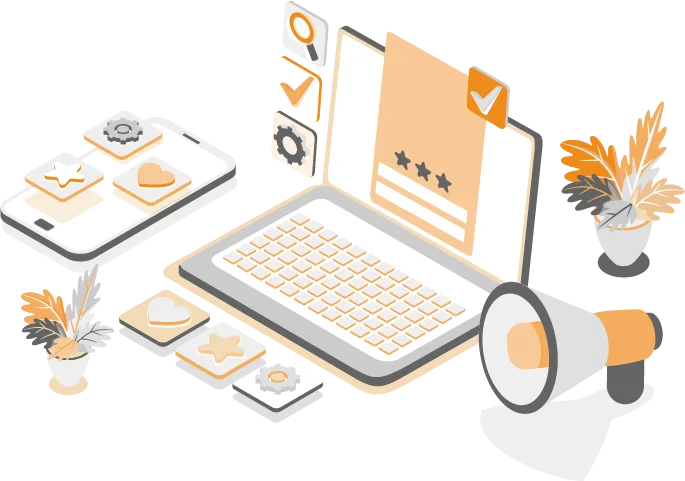What challenges are Human Resources facing ?
Shaken by the advent of working from home and the uncertainty of the economic context in 2020, the HR department, whose role is becoming more prominent in corporate decision-making, needs to implement a real digitised growth strategy for 2021. But what are the new managerial challenges and what strategies should be put in place?
17 May 2022
The tasks of the human resources department in the midst of digital transformation
Traditionally, the role of the human resources department is to be:
- A strategic partner: the HR manager's role is to implement the corporate strategy for all internal stakeholders.
- A change agent: the role of a professional is to assist the company's transformations. They must pursue a policy of acquiring new skills through employee training.
- An administrative expert: a significant part of the department's work consists of infrastructure management and organisational reengineering.
- An employee champion: the human resources department should be as close as possible to the needs of its employees. It must meet their expectations, develop talent, and optimise the overall employee experience.
Today, with the contribution of digital technology, HR management is becoming more and more strategic, and the year 2021 marks a turning point. Human resources management needs to focus on five new challenges in order to deal with the economic context and the upheavals in working methods.
What are the new managerial challenges for HR directors in 2021?
In 2021, Human Resources Departments will have to adapt their strategies according to 5 new challenges. Preparing for the future of work with an employee-oriented approach will be the key strategic axis to pursue. In this context, they will have to rely on the power of digital tools to achieve their objectives.
Challenge 1: Improving employee skills
Skill management is a key mission for Human Resources. Individual and group skills are the source of value creation and competitive gains for the company. Therefore, identifying and training employees in the skills that are lacking is the main challenge for 2021.
According to Gartner, the average required skill level is increasing by 10% each year, and 33% of the skills needed for an average job in 2017 will no longer be needed in 2021. At the same time, 71% of HR managers indicate that employees will need to integrate new skills as a result of new forms of work.
To set up an operational training plan, you must first identify the key skills to be acquired in relation to your business sector. To do so, it's a good idea to approach the various departments in your company to gather opinions.

If you don't already have a system in place, consider adopting HRIS (Human Resources Information System) software. The competency management modules of these digital tools will provide your HR department with a specific and global view of the strengths of your company. You will thus be able to identify your future skills needs and adapt your strategy. Once identified, 'industrialise' the acquisition of these skills through an e-learning space.
Only with such a training policy will you be able to catch up on 75% of the missing skills in 2021.

Challenge 2: Facilitating change management
For 46% of respondents, facilitating change management is a priority for 2021. For several years, companies, HR department included, have focused on efficiency by tightening workflow processes. However, this type of rigid organisational structure is no longer adapted to the rapid changes in the market.
As a result, only 19% believe their employees are capable of changing direction quickly in the face of market fluctuations. Similarly, 62% believe that their employees are not able to identify the tasks that add the most value for the customer.
In this uncertain and turbulent environment, the role of human resources managers in 2021 is to transform a rigid company into a flexible structure capable of responding to economic and circumstantial upheavals.
To do this, you'll need to organise your work time according to certain essential tasks. Those that will place your employees at the heart of value creation for your customers. Automate tasks that can be automated such as administrative management (payroll, holidays) or HR processes (recruitment, skills management, etc.). This way, your workflows will become more fluid.
Challenge 3: Developing talent leadership
Employee loyalty and developed talent create value for the company. Talent development starts with recruitment and continues through to career development. You therefore need to identify them carefully.
However, for almost 1 in 2 employees in the sector, the processes currently in place do not allow for the emergence of good leaders. Only 44% of employees consider management to be capable of effectively managing a crisis. Furthermore, it appears that this problem of trust is due to the lack of diversity in management, which was mentioned by 50% of HR managers.
Therefore, to recruit and retain the right leaders, you will probably need to develop a networking programme. Take advantage of the power of professional networks (Linkedin, Viadeo...) and the talents you meet at trade fairs, conferences, and private forums. But also, make use of employee data !
Career management modules allow you to view the profiles of your employees (CV, training, annual reviews, etc.). Hidden talents will be uncovered, and you can make decisions based on practical information. Finally, to diversify talent, use candidate data analysis features to select profiles based on your diversification criteria.
Challenge 4: Preparing for the future of work
Today, 62% of Human Resources Departments do not have a clear-cut strategy for dealing with new ways of working. However, with the rise of hybrid work and the increase in mobility, it would appear that Human Resources Departments need to implement a strategy that is operational rapidly.
In 2021, the general trend in company practices will obviously be remote work. HR departments will collect more data about their employees, and companies will use service providers. As for human capital managers, they will have the primary role of maintaining social relations.
In addition, managers will need to prepare for the impact of new technologies on the organisational structure. For 26% of respondents, their companies are unprepared for the impact of artificial intelligence on workers.
To adjust to new ways of working, use unifying platforms like the Cloud. With real-time information sharing, your employees can continue to work efficiently while mobility is made easier. Group communication tools such as Microsoft Teams are essential to maintaining social connections and a sense of belonging.

As far as new technologies are concerned, you need to detect how they will impact your employees and their projects. In this sense, you will have to rely on KPIs to help you evaluate the degree of impact. Think of Business Intelligence tools that will help you detect trends in your sector.
Challenge 5: Fostering the employee experience
How can I foster the employee experience in a remote working context? This is the question 28% of HR managers and 48% of diversity and inclusion managers are asking.
In 2021, HR managers estimate that 48% of employees are working from home, which is 18% higher than pre-pandemic figures. In this context, the department has a major role to play both in the inclusion of new recruits and in the well-being of existing employees. This is why the use of digital tools is essential to your employee experience strategy.
When it comes to recruitment, choosing to digitise the onboarding process reduces costs and allows you to focus on the employee experience. Ensure employee wellbeing by redefining appraisal criteria. And above all, maintain strong communication with your employees. Unhappiness at work is estimated to cost €12,000 per year per employee...
How can we meet the challenges of Human Resources management with digital solutions?

Today, 1/5 of companies consider themselves well adapted in terms of their digital transformation, and 39% consider that they have not yet done enough. So, how do we meet the new challenges of HR management, knowing that the department needs to accommodate new priorities? It is simply not possible. The use of digital tools is the basis of your strategy. So why use HRIS software?
To automate time-consuming administrative tasks.
HRIS is a powerful tool for automating administrative tasks. In this respect, 60% of employees in the department indicate that the management solution helps them with payroll and filing: 58% with administrative management and 56% with managing absences and workforce planning.
The use of HRIS frees up time and allows assignments to be adapted. 75% now state new data analysis assignments.
Focusing on human capital
Thanks to data analysis (employee files, absences, applications, etc.), the department can identify areas for improvement in the employee experience. These features allow you to create new, higher value-added projects. That's why 61% state optimisation of the employee experience. Furthermore, while 56% of respondents can now source talent on social networks, for 50%, these marketing/HR projects improve the company's image and attract new talent.
Today, HRISs are becoming more sophisticated. The automation of administration is no longer innovative but is the basis of a good digital strategy. Management software is increasingly moving towards strategic and complex areas such as onboarding or recruitment thanks to Big Data and Artificial Intelligence. That's why you need to make sure you have the right tools and work alongside professionals who can help you implement a real digital HR strategy.
Why choose Absys Cyborg to transform your company's human resources department?
Absys Cyborg is the leader in Sage and Microsoft software integration. For more than 30 years, our methodology has enabled us to support our clients as closely as possible according to their needs. With over 3000 customers, your satisfaction and the success of your projects are our priorities. Thanks to our teams specialised in each area of expertise (HR, Finance, Marketing...), we can support you in each of your projects, from the simplest to the most complex.
Choosing Absys Cyborg for your HR project means receiving sound advice while selecting your solution, continuous follow-up for your project, and the guaranteed durability of your management software.